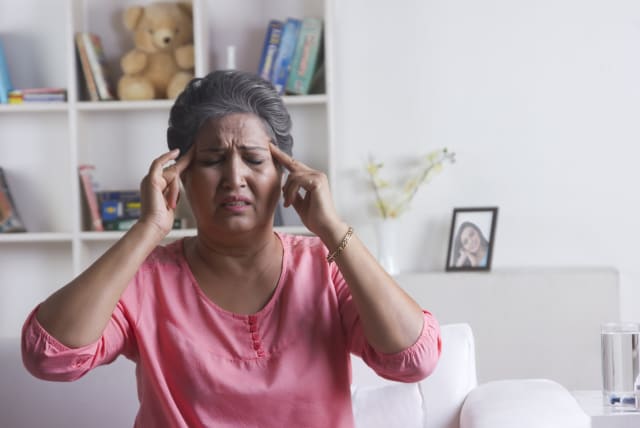The hot weather may be making this medical condition worse

The hot and hazy weather can cause migraine attacks. Dr. Oved Daniel, chair of the Israeli Headache Society, explains what these attacks look like and what can be done to avoid them.
The heavy haze and high temperatures that Israel recently experienced may cause migraine attacks and even worsen the frequency and intensity of pain among those who suffer from migraines.
Approximately one million Israelis suffer from migraines with varying degrees of severity, and more than half of sufferers are sensitive to weather changes including exposure to strong sunlight, extremely hot or cold weather, high humidity or dry air, and dust particles, leading to the intensification of migraine attacks.
Migraines are a common neurological disorder that causes moderate-severe headaches with variable frequency. In fact, migraine disorders are the most common neurological disorder in the world affecting about 15% of the world's population. Its prevalence in Israel is about 10-15% of the adult population with women two to three times more likely to develop a migraine.
The World Health Organization has defined a migraine as a limiting chronic illness that causes noticeable problems in how one functions and significant damage to quality of life, while harming a patient's overall health, family relationships, social functioning and ability to work and study.
What does a migraine attack look like?
A migraine attack is characterized by episodic headaches, usually unilateral, with a moderately severe pain level that can last up to 72 hours at a time, or even longer. The person experiencing it may also suffer from nausea or vomiting.
The pain worsens with exertion and for some people, it can also worsen with exposure to light and noise.
Two main forms of migraine can be distinguished: migraine without aura (pre-event) and migraine with aura.
In the case of a migraine attack with aura, the aura appears before the headache and lasts on average about half an hour, and is often manifested as a visual field disturbance with the appearance of flashing or jagged lights or blind spots in the field of vision, a sensation of disturbance in the body or difficulty in speaking.
There is also evidence that in some cases, a feeling of nervousness, fatigue and either a lack or excess of appetite will appear in the 24 hours preceding the attack.
Effect of change of seasons on migraine attacks
Close to half of migraine sufferers may be very sensitive to changes in the weather. To date, no explanation has been found for this phenomenon, but it appears that changes in the weather cause the chemical system in the brain to go out of balance, creating a change in serotonin levels, which contributes to the development of a migraine attack.
Another factor that strengthens the connection between exposure to strong sunlight and exacerbation of migraines is that people who get migraines have optic nerves which are more sensitive to light compared to people who don't get migraines. Also, sleeping fewer hours affects migraine attacks, and since summer sleeping hours are shorter, you can expect an aggravation of migraine attacks.
Various triggers may cause more frequent and intense attacks including strong sunlight, extreme hot or cold weather, high humidity or dry air, windy, stormy weather, and changes in barometric pressure (the pressure of the air's weight against the ground).
How can migraine attacks be prevented?
In order to try and reduce the frequency of attacks and the intensity of the pain, several basic steps can be taken.
First, it's recommended to keep a headache diary that records the attacks and the factors that led to them. This helps identify weather-related triggers and we can act to neutralize them as much as possible.
For example, when it's excessively hot, stay in a closed and shady place and try not to leave the house. Another recommendation is to try and maintain a healthy lifestyle and make sure to eat healthy food, engage in physical activity, drink a lot, get enough sleep and avoid stress as much as possible.
Treating migraine attacks
It's important to remember that medication should be taken as soon as the migraine attack begins, and not to wait until it gets worse. There are many over-the-counter pain relievers which are drugs from the Triptan family. Within the last two years, a new generation of soluble oral medications, which are effective both in preventing the attack and in preventing and reducing the frequency of attacks came onto the market.
The advantage of the new drugs is that they can be given to everyone, even to people who can't use triptans due to underlying diseases including heart disease, and they have an excellent safety profile, meaning that there are almost no side effects so patients can quickly return to their daily routine and lead a normal lifestyle.
Dr. Oved Daniel is the chair of the Israeli Headache Society of the Israel Neurological Association.
Jerusalem Post Store
`; document.getElementById("linkPremium").innerHTML = cont; var divWithLink = document.getElementById("premium-link"); if (divWithLink !== null && divWithLink !== 'undefined') { divWithLink.style.border = "solid 1px #cb0f3e"; divWithLink.style.textAlign = "center"; divWithLink.style.marginBottom = "15px"; divWithLink.style.marginTop = "15px"; divWithLink.style.width = "100%"; divWithLink.style.backgroundColor = "#122952"; divWithLink.style.color = "#ffffff"; divWithLink.style.lineHeight = "1.5"; } } (function (v, i) { });

